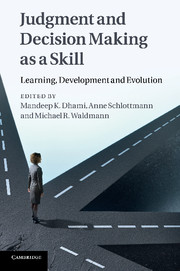Book contents
- Frontmatter
- Contents
- Figures
- Contributors
- Preface
- Acknowledgments
- Chapter cross-reference table
- Part I Evolutionary and neural bases of JDM
- Part II Developmental approaches to JDM
- Part III Learning JDM
- 6 Learning of judgment and decision-making strategies
- 7 Causal models in judgment and decision making
- 8 Learning judgment and decision making from feedback
- Part IV Improving and aiding JDM
- Conclusion
- Index
- References
7 - Causal models in judgment and decision making
Published online by Cambridge University Press: 05 December 2011
- Frontmatter
- Contents
- Figures
- Contributors
- Preface
- Acknowledgments
- Chapter cross-reference table
- Part I Evolutionary and neural bases of JDM
- Part II Developmental approaches to JDM
- Part III Learning JDM
- 6 Learning of judgment and decision-making strategies
- 7 Causal models in judgment and decision making
- 8 Learning judgment and decision making from feedback
- Part IV Improving and aiding JDM
- Conclusion
- Index
- References
Summary
Introduction
Probabilistic models have dominated judgment and decision making (JDM) research, both in terms of the normative theories that people should conform to, and the mental models that people use to reason and decide under uncertainty. This is perfectly natural – what else could (or should) lie at the center of our capacity to reason about uncertainty? In this chapter, however, we will argue that this focus on probabilistic models has obscured and sidelined an equally fundamental concept – causality. Moreover, shifting the focus onto causal models gives us a better understanding of how people make judgments and decisions under uncertainty. This thesis is not entirely new, but recent work in causal inference, both theoretical and empirical, has paved the way for a more formal and in-depth exposition. We will present a sampling of this work, and link this with questions traditionally addressed by JDM research.
Correspondence and coherence theories of JDM
Research in JDM has followed two major paths (Hammond, 1996). On the one hand, correspondence theories have focused on the fit between an organism’s judgments and the environment. Thus, judgments are analyzed and assessed in terms of their correspondence to properties of the external environment. For example, probability judgments are appraised by their proximity to some objective measure in the world (e.g. a relative frequency in an appropriate reference class). Hence, the judged probability that a randomly chosen British man of 55 years suffers a heart attack next year is assessed against the actual relative frequency of heart attacks amongst the relevant population of British men. In short, judgments are assessed in terms of empirical accuracy.
- Type
- Chapter
- Information
- Judgment and Decision Making as a SkillLearning, Development and Evolution, pp. 169 - 198Publisher: Cambridge University PressPrint publication year: 2011
References
- 1
- Cited by



